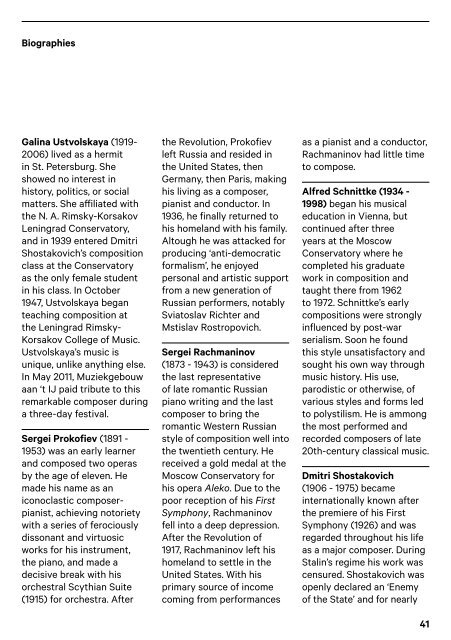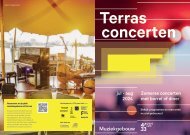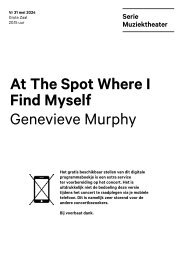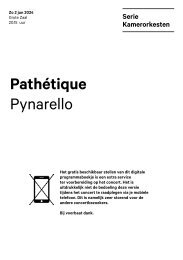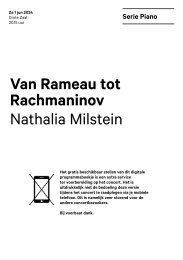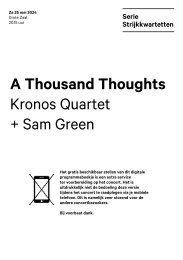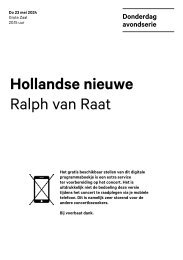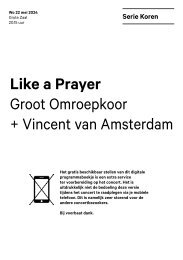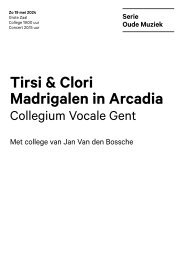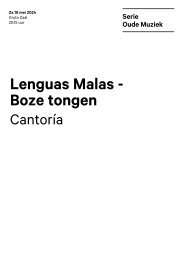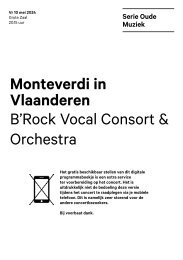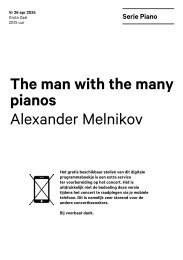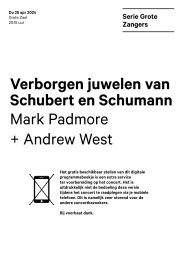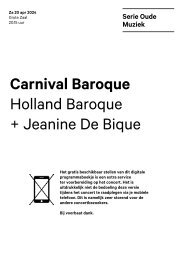Create successful ePaper yourself
Turn your PDF publications into a flip-book with our unique Google optimized e-Paper software.
Biographies<br />
Galina Ustvolskaya (1919-<br />
2006) lived as a hermit<br />
in St. Petersburg. She<br />
showed no interest in<br />
history, politics, or social<br />
matters. She affiliated with<br />
the N. A. Rimsky-Korsakov<br />
Leningrad Conservatory,<br />
and in 1939 entered Dmitri<br />
Shostakovich’s composition<br />
class at the Conservatory<br />
as the only female student<br />
in his class. In October<br />
1947, Ustvolskaya began<br />
teaching composition at<br />
the Leningrad Rimsky-<br />
Korsakov College of <strong>Music</strong>.<br />
Ustvolskaya’s music is<br />
unique, unlike anything else.<br />
In May 2011, Muziekgebouw<br />
aan ‘t IJ paid tribute to this<br />
remarkable composer during<br />
a three-day festival.<br />
Sergei Prokofiev (1891 -<br />
1953) was an early learner<br />
and composed two operas<br />
by the age of eleven. He<br />
made his name as an<br />
iconoclastic composerpianist,<br />
achieving notoriety<br />
with a series of ferociously<br />
dissonant and virtuosic<br />
works for his instrument,<br />
the piano, and made a<br />
decisive break with his<br />
orchestral Scythian Suite<br />
(1915) for orchestra. After<br />
the Revolution, Prokofiev<br />
left Russia and resided in<br />
the United States, then<br />
Germany, then Paris, making<br />
his living as a composer,<br />
pianist and conductor. In<br />
1936, he finally returned to<br />
his homeland with his family.<br />
Altough he was attacked for<br />
producing ‘anti-democratic<br />
formalism’, he enjoyed<br />
personal and artistic support<br />
from a new generation of<br />
Russian performers, notably<br />
Sviatoslav Richter and<br />
Mstislav Rostropovich.<br />
Sergei Rachmaninov<br />
(1873 - 1943) is considered<br />
the last representative<br />
of late romantic Russian<br />
piano writing and the last<br />
composer to bring the<br />
romantic Western Russian<br />
style of composition well into<br />
the twentieth century. He<br />
received a gold medal at the<br />
Moscow Conservatory for<br />
his opera Aleko. Due to the<br />
poor reception of his First<br />
Symphony, Rachmaninov<br />
fell into a deep depression.<br />
After the Revolution of<br />
1917, Rachmaninov left his<br />
homeland to settle in the<br />
United States. With his<br />
primary source of income<br />
coming from performances<br />
as a pianist and a conductor,<br />
Rachmaninov had little time<br />
to compose.<br />
Alfred Schnittke (1934 -<br />
1998) began his musical<br />
education in Vienna, but<br />
continued after three<br />
years at the Moscow<br />
Conservatory where he<br />
completed his graduate<br />
work in composition and<br />
taught there from 1962<br />
to 1972. Schnittke’s early<br />
compositions were strongly<br />
influenced by post-war<br />
serialism. Soon he found<br />
this style unsatisfactory and<br />
sought his own way through<br />
music history. His use,<br />
parodistic or otherwise, of<br />
various styles and forms led<br />
to polystilism. He is ammong<br />
the most performed and<br />
recorded composers of late<br />
20th-century classical music.<br />
Dmitri Shostakovich<br />
(1906 - 1975) became<br />
internationally known after<br />
the premiere of his First<br />
Symphony (1926) and was<br />
regarded throughout his life<br />
as a major composer. During<br />
Stalin’s regime his work was<br />
censured. Shostakovich was<br />
openly declared an ‘Enemy<br />
of the State’ and for nearly<br />
41


